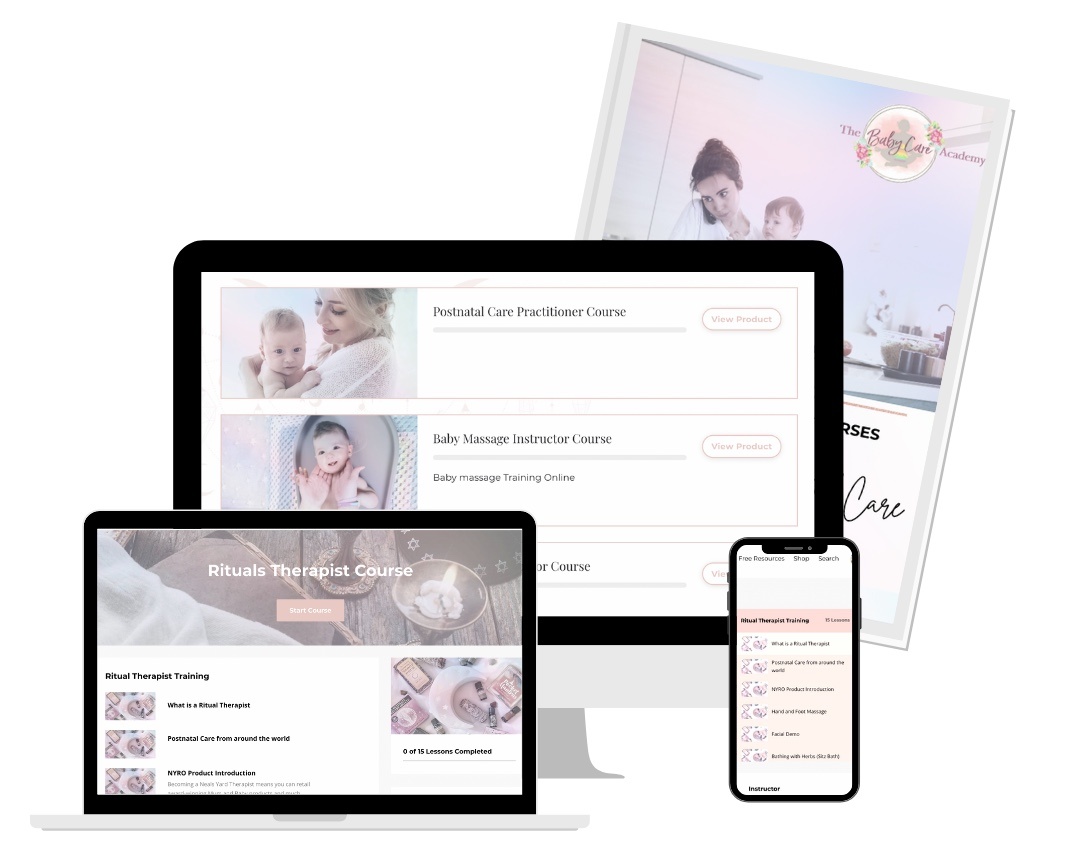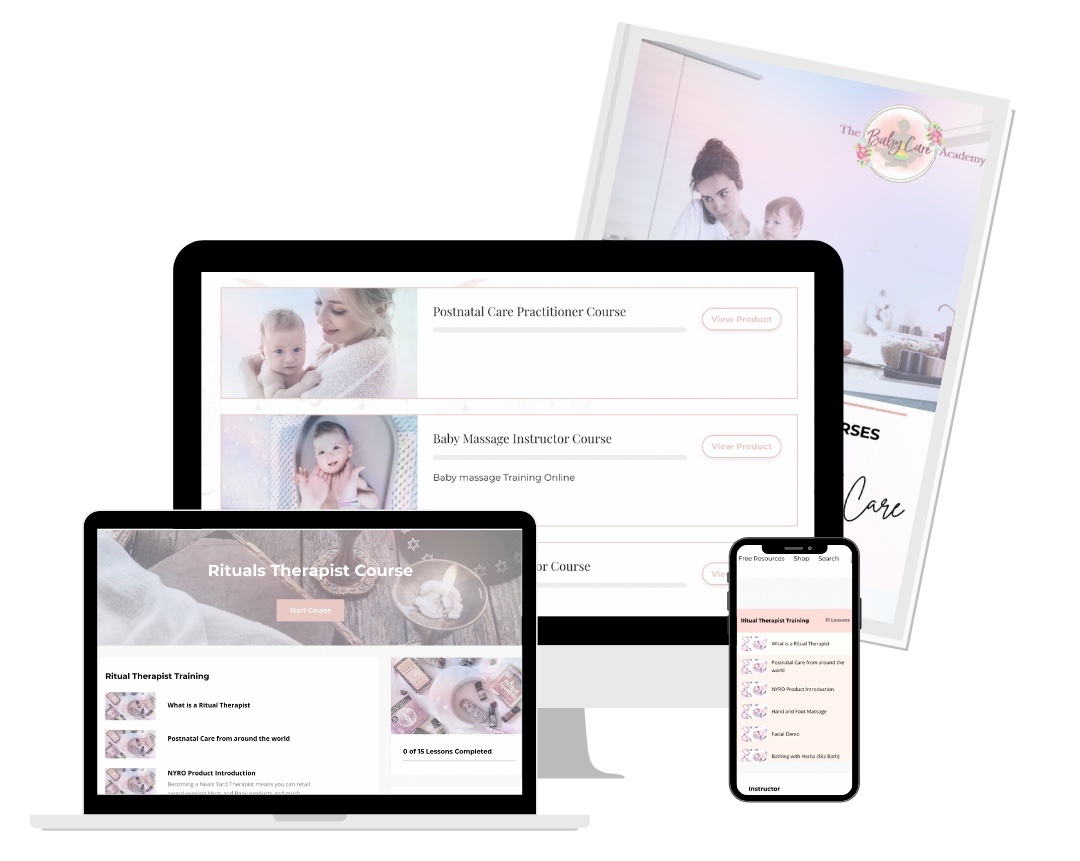Holistic Birth and Holistic Hypno Birthing Instructor Course
This course is for those interested in birth and all of its processors, to learn the skills needed to assist others with knowledge and preparation for an empowered birth, and reducing fear and worry of the unknown. This is done through providing education classes before birth to expectant parents. Practitioners can earn a good living, helping others and enjoy a serene existence, empowering parents and working on their own schedule.
You could be qualified in only 3 months!
Only £550 - Payment Plans available
you might be feeling ...

01.

02.

03.

How it works...
20 CPD Points
Assessment:
Q and A Assessment to be completed online after each module. no practical assessment.
We mark all your work and provide personalised feedback, no robots here!


What our students are saying



♥️
We are family here
You will get instant lifetime access to the course, so you can learn at your own pace and receive unconditional support throughout your career.
Hi my name is Clare Marie
I am the founder of The Baby Care Academy. I have been in business 15 years and have a true passion for Mum and Baby Care.
I am always around to help if you need additional support.

Whats Included:

Introduction
Learning Objectives,
Mission Statement,
Our Principles,
Declaration,
How the course will run,
Further Learning

Module 1 - The role of a Antenatal /Hypnobirthing Teacher
History of Birth support,
Benefits of antenatal education,
statistics to be aware of,
role and responsibilities,
What the role is not ,
Communication skills,
Verbal and Non Verbal Communications skills,
Barriers to Communication,
Use of Technical Language,
Empathy and Sympathy, Assumptions,
Active listener,
Develop your comfort level,
Confidence to teach,
addressing difficult questions,
Advice, recommendation and support,
Reflective Journalling,
The difference with NHS Classes,
help writing a birth plan.
Module 1 Assessment

Module 2 - Health and Nutrition in Pregnancy
First Trimester Aliments,
First Trimester Self Care
Second Trimester Aliments
Second Trimester Self Care
Importance of a balanced diet
Top tips for healthy eating
Nutrition in Pregnancy
Exercise in Pregnancy
Self Care in Pregnancy
Module 2 Assessment

Module 3 - The Natural Birth Process
Initiation of Labour
Signs of Labour
Premature Rupture of Membranes
What happens during labour
Stages of Labour
Indications of labour
The 4th stage of labour
Birth demo using props
Module 3 Assessment

Module 4 - Pain relief during labour
Physiology of labour pain
Causes of pain in labour
Arm in the air exercise
The benefits of stress hormone
Hormones in labour
Attitudes to pain
Pain theories
Factors affecting pain transmission
Fear response in the body
Why we discuss all pain relief options
Inhaled pain relief
Injected pain relief
Epidural pain relief
Module 4 Assessment

Module 5 - Hypnobirthing Techniques
Hypnosis
The Morgan Method
The Le Claire Method
History of hypnosis and Hypnobirthing
Relaxation
Massage and Warmth
Vocalisation
Breathing Patterns
TENS Machine
Movement
Birth Positions
Birth language
Affirmation Cards
Music
Guided Meditations
Addressing Fears and Concerns
Using your BRAIN
Positive Birth environment
Blowing a Balloon
The role of Birth Partner
Daily Practise before Birth
Preparation for birth day
Module 5 Assessment

Module 6 - Management of Labour
Active Management v Expectant Management
Origins of Active Management
Expectant Management
Unassisted Childbirth
Induction of Labour
Medical reasons for induction
Non Medical reasons for Induction
Methods of Induction
Pitocin side effects
Augmentation of Labour
Expectant due dates
Electronic foetal monitoring
Vaginal examinations in labour
Delayed cord clamping
Episiotomy
Forceps assisted birth
Vacuum assisted birth
Placenta Previa
Module 6 Assessment

Module 7 - Different types of Birth
Birth Plans
Place of Birth Introduction
Home Birth
Birth Centre Birth
Planned Caesarean Section
Emergency C Section
Vaginal seeding
Long Labour
Quick Home Delivery Labour
Twin Births
Module 7 Assessment

Module 8 - Grief and Loss Support
Disclaimer
Dealing with grief
Theories of grief
Miscarriage and Depression
The vocabulary of Miscarriage
Making sense of Miscarriage
Stillbirth and Neonatal Death
The emotions of Loss
Module 8 Assessment

Module 9- Postnatal Physiology of Mum and Baby
Phyiological changes in the mother
Lochia
Breast Changes
The Golden Hour
Why Breast is best
Hormones controlling milk production
Getting Breast feeding established
Good signs and indications
Module 9 Assessment

Module 10 - Newborn Assessment
Newborn Assessment
Physiological changes in Baby
Heart Rate
Temperature Control
Foetal and newborn normal heart
Cardiovascular System
Urinary system
Skeletomuscular system
The first Skin to Skin
Delayed Cord Clamping
Genitalia and Breasts
Circulation
Respiratory efforts
Muscle Tone
Reflex irritability - Apgar score
Mother and Baby Separation
Routine Screen Tests
Understanding Test Results
Common Newborn Illness
Module 10 Assessment

Module 11 - Class Structures
Week 1 - Pain in labour
Week 2 - The natural birth process and Breathing
Week 3 - Hypnobirthing techniques, movement and Birth Partner
Week 4 - Medical interventions
Week 5 - Birth Plans, Place of Birth
Week 6 - Pre and Postnatal Care for Mum and Baby
Class Structures
Hypnobirthing Teacher Tool Kit
Take a look inside 👀

Bonus One
Bonus Two
Download our App to learn on the go
Get through your study and access your courses and social community at the touch of a button. Download it to your phone and study on the go.

Got Questions?
Here is some of our most common questions.
Where Do I Study The Course?
How Do I Find My First Clients?
What If I Haven't Studied Before?
What If I Am Struggling To Study ?
Is the Course Accredited/ a recognised Qualification?
Can I gain insurance too practice with this course?
What my students are saying



Who this course is for
- Those that want to offer Antenatal education to others
- Those that want to offer work online or in-person
- Those that are self-motivated to study the course.
- Those that value Gentle Parenting techniques.

This course is not for
- Strict old fashioned methods of baby care
- Those that can dedicate time to study the skills
- Those who cant easily support families

